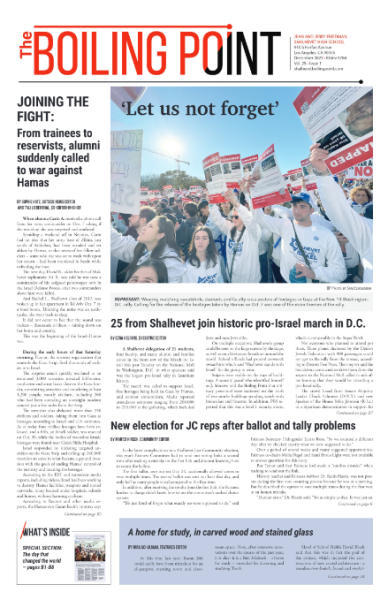PAGE THREE: Waiting for the day
April 9, 2017
By Micha Thau, Staff Columnist
That outfit is so gay!” “Stop being a fa**ot and let’s go.” “Don’t be so gay, just do it.”
Phrases like these echoed around my skull during my dark days in the closet. Whenever I heard them, however I may have been feeling that day, they stripped me of my confidence, devalued me, and contributed to why I chose to suffer rather than reveal myself for who I truly was.
With an entire dictionary full of pejoratives and in- sults available – and limitless more in slang – it baffles me why, despite constant pleading on the part of the LGBTQ+ community, insults like these continue to be used. It is a form of bullying, whether intended or not.
Even when used by friends, terms like these con- tribute to decisions to stay hidden. Imagine if some- thing integral to your identity was used as an insult.
For example, what if, in the same way that some people tend to say “Gaaaayyy” after someone acts vul- nerably, someone instead said, “Jeeewwww,” and then laughed. Yes, it is in a joking manner and no, that per- son is not fundamentally attacking you – nor are they a bad person themselves. But the effect is the same.
When someone uses a part of who you are pejora- tively, they devalue you whether intentionally or not. Some may argue that I am being overly conscious
to words that are so small and go by quickly. But there is a Talmudic story about Rabbi Akiva that explains their effect.
Rabbi Akiva passed by a rock with a rather large indent in it. He noticed a flow of water right above it that continually dripped onto the rock.
He marveled at the effect the water had. Each drop separately was of little conse- quence to the rock, but together over the years they put a dent in something even as strong as stone.
In the same way, each time someone uses a word like gay as an insult, they see no immediate consequence. But the damage is slowly accumulating. And a human being is much softer than a stone.
Another argument justifying this type of language is the principle of freedom of speech. But free speech is a responsibility, not a get-out-of-jail-free card.
Of course people have the right to use homosexu- ality as an insult – but having the right doesn’t mean it is right.
I may have the right to violate a verbal contract, as I have no legal obligation to fulfill its terms – but to do that is clearly still morally wrong.
The fact is that when you use these words as insults, you do irreparable harm to people’s confidence and self-acceptance.You might even keep them from com- ing out, which has deep negative psychological conse- quences and you devalue core parts of their identity.
And if you think this is all about me, I promise you there are other students in our school who still are waiting in silence and in pain.
For now, I am still waiting and hoping for the day when not just gay lingo becomes a non-insult, but when many other cultures’ and groups’ identities are not devalued by their common use as insults. A day when people don’t roll their eyes when someone uses these words and someone else says, “That isn’t cool.”
And most of all, I dream of the day when someone says, “That outfit is sooo gay,” and people raise their eyebrows in confusion.













